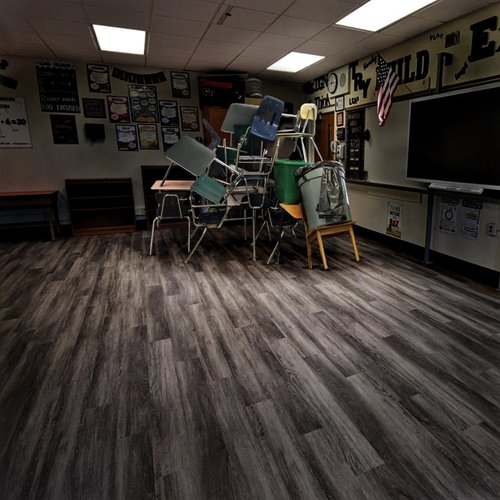
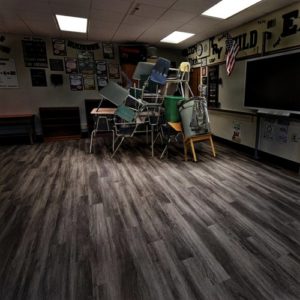 rating=2]Sandy Hook, Parkland High School, Virginia Tech, Columbine: These school shootings and countless others are etched in our collective memories. On the fourth anniversary of the massacre at Marjorie Stoneman Douglas High School and the fourteenth anniversary of the Northern Illinois University shootings (both taking place on Valentines Day), we are presented with this dramatic play “This Is Only a Test”, a dark satire that explores the issue of how high school students might avoid being sitting ducks when an armed intruder is bent on killing and maiming them. Playwright Eric Reyes Loo has taken on a very ambitious task when he uses theatre to discuss this important subject matter. He asks the right questions about the “insane burden” that society may be placing on children to protect themselves at a time when there are increasingly frequent acts of mass murder in our schools—and when society has fallen short in protecting our youngsters from fatal harm. Though Loo grapples with powerful ideas in his script, it is unfortunate that the play and its execution fall short.
rating=2]Sandy Hook, Parkland High School, Virginia Tech, Columbine: These school shootings and countless others are etched in our collective memories. On the fourth anniversary of the massacre at Marjorie Stoneman Douglas High School and the fourteenth anniversary of the Northern Illinois University shootings (both taking place on Valentines Day), we are presented with this dramatic play “This Is Only a Test”, a dark satire that explores the issue of how high school students might avoid being sitting ducks when an armed intruder is bent on killing and maiming them. Playwright Eric Reyes Loo has taken on a very ambitious task when he uses theatre to discuss this important subject matter. He asks the right questions about the “insane burden” that society may be placing on children to protect themselves at a time when there are increasingly frequent acts of mass murder in our schools—and when society has fallen short in protecting our youngsters from fatal harm. Though Loo grapples with powerful ideas in his script, it is unfortunate that the play and its execution fall short.
When the principal at Washington High School decides that the typical active shooter drills don’t seem to work because the students are so ho-hum about them, she decides to hire a trained self-defense instructor to empower the students to take a more active role in their own safety. In this show, we see the dire consequences of what can happen when self-defense is taken a step too far and turns into undesired aggressive behavior. “This Is Only a Test” explores how the fine line between protecting one’s life and limb versus lashing out at others could become blurred and breached in the minds of teenagers.
One of the best aspects of the show is the play within a play where the tragedy of the Sandy Hook Elementary School mass shooting is relived. Another great part is watching how each of the five students responds very differently to the self-defense training in accordance with their backgrounds and their personalities; clearly, this is a major thrust of the show. In conjunction with this, I liked the various subplots where we get some insight into each of the students’ personal lives and family situations, but not all of this is necessary. While the back stories personalize the students, the focus on too many aspects of their private lives detracts from the main point of the performance.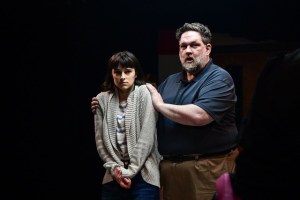
Another problem with the show is that it’s a bit of a strawman argument. The type of self-defense lessons being offered to the students make little or no sense. For starters, the instructor normally provides lessons to adults in corporate settings and no adaptation has been made for these skills to be taught in an age-appropriate way to teenagers. More specifically, teaching students to approach the intruder and dogpile on him is unrealistic. Escapes and distractions make far more sense, especially when dealing with children and teens. So to my mind, the issue is not so much whether the children should or should not be taught self-defense lessons but the nature of the lessons which could or should be taught. (And I say this with some expertise, having taken over ten years of martial arts training when I was in my 20s and 30s.)
The biggest problem with the show, however, is that it ignores the 1000-lb. elephant in the room, namely, the involvement of classroom teachers in any type of self-defense training. They are the ones who probably will be barking orders and telling kids to “get down” or “lock the door” or “cover up the window”, or they may suggest barricades or distractions. Teachers are an important presence throughout the school, and students generally look up to them and rally around them for support in an uncertain situation—this despite the fact that they may or may not necessarily want to listen to them during class time. Many teachers will tell you just how much they are willing to sacrifice themselves for the safety and well-being of their students. Therefore, depicting no teachers at all as flesh-and-blood characters means that there is a gaping hole in the script.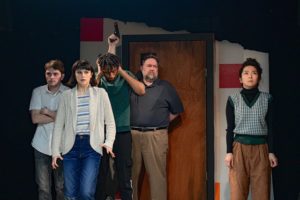
A number of characters are particularly intriguing. I especially liked the character of the principal (RjW Mays) and found her to be very authentic. I liked the character of the instructor (Christopher M. Walsh) too, especially when he tells the students politely but firmly about the need to defend themselves and preserve their lives. However, these same two actors play the roles of all the children’s parents, when, in fact, they should have been solely dedicated to the two larger roles. To put things more generally, the cast should have been larger. That said, I liked that the same two actors played all of the various parents of all of the different children. The parents may have differed in personality, attitude, and demeanor, but regardless, they are still parents. What they have in common is a child in school who could be killed or critically injured, and they also share some amount of worry.
The cast includes Zhanna Albertini (Selma), Graham Helfrick (Kramer), RjW Mays (The Woman), Sophia Vitello (Lenore), Christopher M. Walsh (The Man), and Austyn Williamson (Wynn). Stage directing by Toma Tavares Langston is very good. The movement of the actors is well-choreographed, especially in the way they used all parts of the stage and moved their own props/chairs to different locations to form different groupings both on and off the platform. Nevertheless, I would have preferred seeing the set design that is on the cover of the program rather than what we see here. The crew member who perhaps deserves the most kudos is fight director Carly Belle Cason, who has done a fabulous job portraying violence and intimacy, which is essential to telling this tragic story.
We are currently living through terrible times. Over the past twenty-three years, mass killings at elementary schools, high schools, colleges, and universities have become a shocking reality in our nation and across much of the world. Parents, teachers, and administrators want children to be safe at school, but everybody is baffled as to how to best accomplish this. As the principal says towards the beginning of the show (and I’m paraphrasing here): “You want the students to be prepared; you just don’t want them to get paranoid.” On an institutional level, we have to ask ourselves how teachers and administrators can best guide our young and impressionable youth who could potentially be victims of a mentally-deranged killer; while on a societal level, we have to ask ourselves what can and should our nation do as a whole to prevent such shootings from occurring in the first place.
What’s good about this show is that it personalizes the “what if” situation of having children responsible for their own self-protection. But what’s bad about this show is that the storyline is somewhat too fragmented; too many portions of this tale get a bit hokey and unnecessarily overdone; and the teachers’ role in this drama is absent. Despite all this, the show can lead to many thoughtful discussions among principals, teachers, parents, and children as well as those in educational administration, government, and politics, and in that respect, the story should have a lasting impact. It also has some interesting twists and turns that make it entertaining, and I was glad to have seen it. “This Is Only a Test” could have been a marvelous satire, but it misses the mark. The script needs a major rewrite.
“This Is Only a Test” is a production of Broken Nose Theatre and is playing through March 12, 2022, at the Den Theatre (2A), 1331 N. Milwaukee Avenue, Chicago.
Tickets are pay-what-you can and are available at https://brokennosetheatre.com/ or through the Dean Theatre, at https://ci.ovationtix.com/35386/production/1078396.
Performance schedule:
Thursdays, Fridays, and Saturdays – 7:30 p.m.
Sundays – 3:00 p.m.
COVID-19 protocols are in effect. Please be prepared to show an ID and vaccination card and wear a mask indoors throughout the entire performance. For more information about the Den Theatre’s COVID policies, go to: https://ci.ovationtix.com/35386/production/1078396
To see what others are saying, visit www.theatreinchicago.com, go to Review Round-Up and click at “This is Only a Test”.





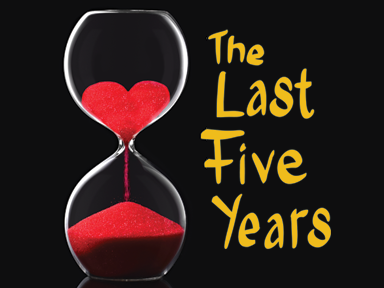
More Stories
“The Firebugs” reviewed by Julia W. Rath
“The Book of Grace” Al Bresloff with another from Paul LIsnek
“The Last Five Years” MILWAUKEE